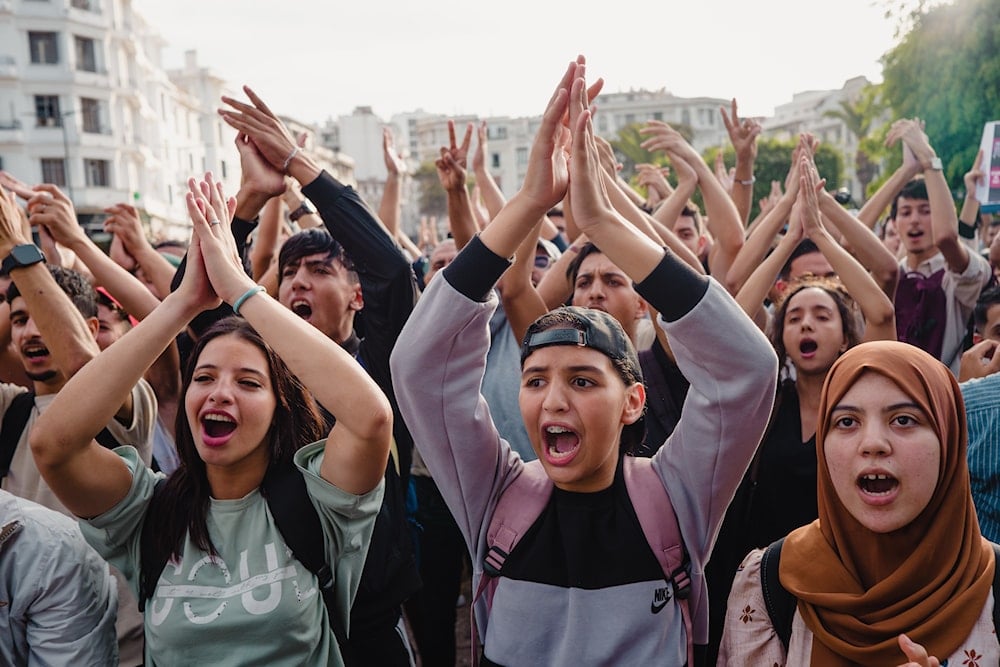Morocco’s youth-led protests intensify amid widespread clashes
Morocco’s youth-led protests intensify as demonstrators demand reforms in healthcare, education, and jobs.
-

People protest against corruption and call for healthcare and education reform in Casablanca, Morocco, on October 2, 2025 (AP)
Anti-government protests across Morocco have escalated as youth-led movements demand sweeping reforms in healthcare, education, and employment. Demonstrations, which began on September 27, have spread to cities including Rabat, Salé, Agadir, and Marrakesh, challenging the government’s prioritization of large infrastructure projects for the 2030 World Cup over essential public services.
The movement, driven by decentralized groups such as GenZ212 and Morocco Youth Voice, has gained momentum through social media platforms including Discord and TikTok. Reports indicate that the GenZ212 Discord server’s membership surged from 3,000 to over 150,000 members by October 2, underscoring widespread support for youth demands.
Clashes, security response
The protests have led to violent clashes with Moroccan security forces. According to the Moroccan Association for Human Rights, over 1,000 people have been detained, with hundreds injured. Authorities reported that three protesters were killed during an attempt to seize weapons from a gendarmerie facility.
Meanwhile, Prime Minister Aziz Akhannouch has reiterated the government’s commitment to dialogue while emphasizing the need to maintain public order. Protest leaders, however, have called for the resignation of the government, citing its failure to meaningfully address citizens’ demands.
Human rights organizations, including Amnesty International, have urged Moroccan authorities to exercise restraint and respect the right to peaceful protest. Observers anticipate further demonstrations in the coming days as youth continue mobilizing across the country.
Read more: Morocco PM urges dialogue as youth protests escalate nationwide
Background: Deadly escalation in Agadir
The violence in Lqliaa near Agadir marked the most severe escalation since protests began. Security forces reportedly used live ammunition after protesters allegedly attempted to seize weapons from a gendarmerie facility. Local authorities claimed self-defense measures were taken after tear gas failed to disperse demonstrators, some of whom reportedly carried knives and set fire to a vehicle and part of the security compound.
The Interior Ministry had earlier promised to protect citizens’ right to protest within legal limits, vowing “restraint and avoidance of provocation.”
Read more: Moroccan security blocks youth protests over health, education
GenZ212 and youth mobilization
GenZ212, a youth-driven collective, has emphasized urgent reforms in healthcare, education, and job creation, citing government negligence toward basic needs.
The movement’s slogan, “Stadiums are here, but where are the hospitals?”, highlights public frustration over prioritizing World Cup infrastructure while essential services remain underfunded.
The protests’ rapid spread was fueled by online organizing, enabling coordinated actions across multiple cities in Morocco.
Read more: Morocco protests escalate into violent clashes with police
Nationwide unrest; socioeconomic context
Unrest has expanded beyond Agadir, with clashes reported in Salé, Tangier, Marrakesh, Biougra, and Taroudant. Demonstrators have looted shops, set fires, and confronted police forces, while Casablanca, Oujda, and Taza witnessed largely peaceful protests demanding an end to corruption and government accountability.
The protests are rooted in systemic grievances, including Morocco’s high unemployment rates—12.8% nationally, with youth unemployment reaching 35.8% and graduate unemployment at 19%—and inadequate public services. Officially, authorities have so far detained 409 individuals, with 193 facing trial on charges including arson, looting, and assaulting security forces. Analysts note that this wave of unrest is the most violent the country has seen since the 2016–2017 Rif protests.
Read more: Morocco’s protests turn deadly; police kill 2 as unrest spreads

 3 Min Read
3 Min Read









